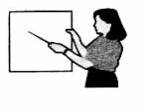
Unit Three Introducing People to Each Other
第三单元 介绍新朋友
导 读
本课中我们将通过两个关于结识新朋友的对话“Lizzy, This Is My Friend”、“Li Ying, This Is Brown”学习用英语介绍别人认识;短文“No Time for Formality”《省去繁文缛节》使我们了解美国人与朋友见面和告别的礼俗及其不拘小节的特点;语法讲动词have并学习主谓宾结构。
译 文
对话一 丽齐,这位是我的朋友
李虹是丽齐和小常的朋友。小常在一所技术学校的招待所工作,她想跟丽齐学习英语。李虹正把她介绍给丽齐。
李虹:晚上好,丽齐。我能占用你几分钟时间吗?
丽齐:噢,是你呀,李虹。有什么事?
李虹:丽齐,这是我的朋友,小张。小常,这是丽齐。
小张:你好,丽齐。
丽齐:你好,很高兴认识你。
李虹:丽齐,小常想跟你学英语。
丽齐:可以,我很荣幸。
小张:谢谢你,丽齐。你真好。
对话二 李英,这位是布朗先生
现在临近暑假,李英想到一家合资企业做份兼职。丽齐正把她介绍给这家公司的经理迈克布朗先生。
丽齐:布朗先生,您好吗?
经理:我很好。丽齐,你好吗?
丽齐:我很好,谢谢。布朗先生,请允许我把我的朋友李英介绍给您。她是我们学校的优等生,英语讲得很流利。
李英:您好,布朗先生。
经理:认识你很高兴,李英。丽齐经常跟我谈起你。你是想在我们公司工作一个月吗?
李英:是的,我很想。我希望能有一点实际的生活体验。您能给我一次机会吗?
短文 省去繁文缛节
美国人总是匆匆忙忙,他们似乎没时间讲究繁文缛节。因此,美国人的不拘小节是有名的。尽管如此,你可能还是会对这种“缺乏礼貌”感到惊讶。这一点在商界尤其如此。大部分美国人(在称呼上)不怎么在乎“职位”或“头衔”。他们经常初次见面时就直呼其名。他们可能会这样向你介绍他们的朋友:“李虹,这是玛丽史密斯”。在这种情况下,你称这位女士为“玛丽”或“史密斯小姐”都可以。美国人与初次会面的陌生人并不常握手,他们经常只是微笑着说“嗨”或“您好”。在美国人看来,这种随便的问候和正式握手是一回事。同样,美国人也没有正规的“告别”方式,他们只是对着大家挥挥手表示再见,或者,他们只是在转身离开前简单地说一声“再见”或 “回头见”,一般情况是不握手道别的。在美国人心中,友好而又不拘泥的关系才是最重要的。
Main points of the text
Dialogue A
1. She wants to learn English from Lizzy.
她要跟丽齐学英语。
1)英语句子里频繁地使用代词 (pronoun) — 代替名词的词 —来避免重复。每当读到有代词的句子,我们必须弄清其指代关系才能明确句子的逻辑关系和结构。这里的人称代词主格She和后面的人称代词宾格her都指常。要弄清代词的指代关系必须仔细体会上下文,尤其当句中关系繁复时。
want to do sth.是词组,意为“要做某事”。英语有条规矩,同一句话 (一个简单句)中避免用两个动词,必须用的话有两个办法解决:一是用个虚词to把他们俩隔开,此时to就变成了不定式符号,与后面的动词一起构成动词不定式;一是在后面的动词结尾加ing使其变成动名词。一个动词后面是加动词不定式还是动名词还是两个都可以不是可以随心所欲的,这里暂不详细解释。先要记住的是,绝大部分to 后面的动词都用原形,但在第六课你将学到一个例外。
eg. I want to send you an e-mail. 我要给你发一份电子邮件。
2)learn sth. from sb. 向某人学习…
注意介词在词组中的使用是固定的,它的变化或取消会导致词组意思的改变,要记住原来的固定搭配。
eg. a mutual friend of A and B work at a guest house introduce A to B
2. Li Hong is introducing her to Lizzy.
这是由 be + v. + ing (现在分词) 构成的现在进行时态。
3. Could I take a few minutes of your time?
我能占用你几分钟时间吗?
4. Oh , it’s you.
口语里有时用it代指人。比如有人敲门:
— Who is it? — It’s me.
5. It would be my pleasure.
我很荣幸。
Dialogue B
1. Now summer vacation is approaching.
暑假快要到了。
1) summer vacation是暑假,那寒假呢?春假?
寒假:winter vacation,另外:春假 spring holiday
2) is approaching 是用进行时表达最近的将来要发生的事。
eg. I’m looking for a part-time job in the summer vacation. 我要在暑假找一份兼职工作。
She speaks good English. 这句话还可以说成:She speaks English well.
speak末尾的s是一般现在时第三人称单数形式。
2. I’ve heard quite a lot about you from Lizzy.
丽齐常常谈起你。
这句话用的是现在完成时态。现在完成时由 have/has + v. (过去分词) 构成, 表明发生在过去的动作其结果影响到现在。本句中I (often) heard quite a lot about you from Lizzy这个发生在过去的动作使得Mr Brown, the manager of the company对李虹印象良好,从而愿意offers her a chance to work for a month in his company.
3. I’d love to.
我很愿意。比I’d like to 意思更强。
Passage
1. No Time for Formality 省去繁文缛节 (或者“没有时间讲究礼节”)
这篇短文谈的是美国人在与人交往中不拘小节的特点。我们先来看看formality这个词的构词特点。英语词汇的构成有三种主要方法,其一就是词缀法,即在一个词的最基本部分(我们称之为词根) 的前头或后面加上前缀或后缀,使其发生变化。
 àformally (adv. 正式地)
àformally (adv. 正式地)
form à formal (adj. 正式的) àformality (n. 拘泥形式)à
 (n. 形态;表格) àinformal àinformality (n. 不拘礼仪)
(n. 形态;表格) àinformal àinformality (n. 不拘礼仪)
(adj. 非正式的)
àinformally (adv. 非正式地)
 再如:care (v. 小心) àcareful (adj. 小心的) à carefully (adv. 小心地)
再如:care (v. 小心) àcareful (adj. 小心的) à carefully (adv. 小心地)
àcareless (adj. 粗心的) àcarelessly (adv. 粗心地)
掌握了词缀构词法,学习单词就可以举一反三,则不必再视记忆单词为畏途。
2. American people are always in a hurry.
这句话中包含词组 be in a hurry。其中be 跟随第三人称复数的主语变成了are。以介词开头的词组在句中做表语时前面要用be 动词,名词和形容词以及名词和形容词性质的词组也是这样。
eg. I’m in good health.
3. It seems they don’t have time for formality.
seem 是系动词, 意为“似乎,看起来”,后面的表语是个句子,称为表语从句。
4. But you may still feel somewhat surprised at this “lack of respect”.
feel/be surprised at 对…惊讶
eg. We Chinese who meet Americans for the first time are often surprised at their informality.
5. This is especially true in the business world.
在商界尤其如此。this指刚才说的informality 和 “lack of respect”
 6. have concern for 关心…
6. have concern for 关心…
have little concern for 不太关心…
have much concern for 非常关心…
have no concern for 不关心…
7. Most Americans have little concern for “rank” or “title”.
大部分美国人(在称呼上)不太注重官阶和头衔。
8. They often use first names upon meeting people for the first time.
他们经常在与别人初次见面时便直呼其名。
1)They在这里指上句的most Americans。
2)美国人名在姓前,first name 是名,往往就是教名given name (天主教徒或基督教徒在初生婴儿或刚入教的人领受洗礼时由教父或教母用某个圣人、圣女的名字起的教名。我们会发现很多外国人都叫同样的名字,如:玛丽亚,约翰等,这些都是教名。学习一门语言也应该熟悉相关的文化。) last name,family name 是姓。
3)upon 意为“当…时候”,是介词,所以后面的动词结尾加了ing。
9. In this situation, you are free to call the lady “Mary” “or “Miss Smith”.
be free to do sth. 自由地,随便地做某事
eg. You are free to go or stay as you please. 或走或留随你的便。
10. There are no handshakes in most cases.
(美国人在告别时)大都不握手。
在这个短文里我们学了三个“握手”,请找出来。
11. the most important thing 最重要的事
the most important 是形容词important的最高级形式,比较级是 more important,意思是“更重要的”。多音节的和除y, er, ow, ble 结尾的双音节形容词和副词变成比较级时前面加more,变成最高级时前面加most;单音节词和以y, er, ow, ble 结尾的规则的双音节形容词和副词的比较级形式是加后缀 -er,最高级形式是加后缀 -est。当该形容词或副词末尾字母为e时只需加 -r或 –st 如:late – later – latest;当该词末尾是单元音加单辅音结尾并且此音节重读时要双写末尾的辅音字母再加 -er或 -est 如:hot – hotter – hottest (符合这种特征的动词在加ing和ed时也要双写末尾的辅音字母);当该词末尾是辅音字母加y时,要把y改成i再加-er或 –est,如:slowly – slowlier – slowliest
More practice of the text
1 Read the passage and tell whether the following statements are true (T) or false (F) :
Mr Fox was an American expert in missile (导弹). He is always in a hurry. People say he is as busy as a bee (象蜜蜂一样忙碌). It seems that he doesn’t have time for formality. In fact he is famous for (以…而著名) his informality. Sometimes people are surprised at his “lack of respect”. He often uses their first names upon meeting them for the first time. For example (例如), last Monday President Bush (布什总统) met him and asked him some questions. When he was introduced to the president he just shook hands with him and said, “Hi, George!” So Mr President was very angry with (生…的气) the fox (狐狸,这里指Mr Fox) (although he himself is well known for his bad habit of nicknaming others 尽管布什自己也有给别人乱起外号这个出了名的坏毛病).
( ) 1. Mr Fox is the president of the US.
( ) 2. Mr Fox is always very busy.
( ) 3. Mr Fox never(从不) respects(尊敬)others.
( ) 4. Last week Mr Fox went to see the president and asked him some questions.
( ) 5. Mr President was very angry with Mr Fox,because the missile expert nicknamed him.
(答后两题时请注意人称代词的指代关系)
2 Read the passage again and try to retell it. 试着用英语讲这个故事
Key:
1.
1. F Mr Bush is the president of the US. 改成Mr Fox is an American expert in missile亦可。
2. T
3. F He is so busy that it seems that he doesn’t have time for formality.
4. F Last Monday President Bush met him and asked him some questions.
5. F because the missile expert use his first name(“George”) upon meeting him.
2. (Open)
Helping you with the exercises
1 Are the following statements true ( T ) or false ( F ) according to Dialogue A?
Key:
1. T (原文用的是mutual friend, 与本句用词不同但意思相同,请注意学习这些表达方式)
2. T
3. F (如果代词代的是什么没有弄清这样的题你就无法判断)
4. T
5. F (They say “Good evening”)
6. T
7. F
8. T
2 Complete the following statements according to Dialogue B.
按照对话二完成下列句子 (注意:并非一空一词)
Key:
1. vacation 2. in a joint venture 3. the manager 4. Lizzy
5. well 6. a lot 7. a month 8. the chance
3 Choose the correct answer from each group of choices.
从各组选项中找出正确答案
Key:
1. d (注意题目中的not)
2. b (注意问的是美国人)
3. c (这是推理题,文中没有直接答案)
4. a (其它三个选项都毫无道理,很好判断,你更应该注意的是并非答案,但似乎也正确的选项,此时你要选出既有道理,又符合原文的选项)
5. b
4 Here is a summary of the patterns and expressions for introducing people.
Read them and try to learn them by heart.
5 Complete the following dialogue according to the given Chinese.
语言是丰富的, 所以汉译英或作对话之类的练习所给的答案并非唯一正确, 仅供参考。一般要求同学们尽量用上刚刚学过的表达法。
Key:
Li: How do you do, Mr. Smith? I'm happy to // It’s nice to meet you here.
Li: You can buy your typing paper (打印纸) in this store. I’m here to see my friend. He is the boss of this stationary store. Please allow me to introduce him to you.
Li: Hi, Xiao Liu. May/Could I take a few minutes of your time? I’d like to introduce you to my friend. // I’d like you to meet my friend. Mr Smith, this is Xiao Liu, my old classmate. Now he is the boss of the store. This is Mr Smith, my English teacher. He is from England.
6 Match synonyms ( 同义词 ) and antonyms ( 反义词 ) in the following columns.
匹配练习。(注意1—8是同义词;9—16是反义词。最好在序号前标字母,连线容易乱)
Key:
1. e 2. f 3. a 4. c 5. g 6. h 7. b 8. d
9. p 10. n 11. l 12. o 13. j 14. m 15. k 16. I
7 Translate the following sentences into Chinese.
Key:
1. 在这个问题上我和我的老师有许多共同的看法。
2. 我想向你了解了解京剧。
3. — 你能借我这本书吗? — 当然,为什么不能?我很乐意借给你。
4. 这家宾馆向外宾提供优质的服务。
5. 他的弟弟/哥哥在一所工业学校/学院学习。
6. 医生,我可以占用你几分钟时间吗?
8 Fill in the blanks with the words and expressions in the box.
用方框中所给的单词和表达法填空
这些单词、词组都是本课刚学过的。如果你忘记了,到前面查一下。填空时既要看上下文的意思,也要根据语法结构判断所需填的词的词性。
in common共同的 twin双胞胎 act做出行动 in the same way以同样的方式
for example例如 interested in对…感兴趣 then那么
the other另一个 Twin sisters 姐妹 hobby爱好 effort努力
Key:
1. especially 2. relationship 3. In most cases 4. similarly 5. ranks
6. have little concern for 7. mutual 8. share 9. Joint
9 Read the short passage carefully and then give a complete answer to each of the questions.
阅读文章后完整回答问题(别用简答),并请猜测单词activity的意思
“activity” means : a. 情况 b. 节目 c. 活动 d. 兴趣小组
Key:
1. Yes , they do. They have a lot of things to do after school hours.
2. They join mature clubs, play musical instruments, edit school newspapers, and take part in all sorts of sports activities.
3. They call them “extra-curricular activities”.
4. They can learn to develop skills, abilities, and attitudes towards life through these activities.
5. Yes, they are.
6. Yes, they are.
“activity” 意为: c. 活动
Grammar Focus
实义动词 have 在主谓宾 ( SVO ) 结构中的用法; 主谓宾结构
Practice your grammar
1 Put the following sentences into Chinese, paying attention to verb to HAVE.
Key:
1. 我们每天有两个小时的英语课。
2. 丽齐在班里有一个好伙伴。
3. 你们有外国英语老师吗?
4. 我有一个幸福的家庭。
5. 任何事物都有两个方面。
6. 史密斯先生有很多中国朋友吗?
7. 我们周六开个晚/聚会好吗?
8. 你们将在食堂吃饭吗?
2 Translate the following sentences into English.
Key:
1. This joint venture does not have many new employees.
2. Mr. Smith has a lot of interesting books.
3. Do you have any friends here?
4. They have English classes every day.
5. We shall have a good time. / will play happily tomorrow.
6. Li ying has Mr. Smith’s address.
7. This joint venture has a company in Beijing.
8. Professor Waters has three children.
Merry Learning
内容详见多媒体配套光盘。
Listening in and Speaking out
1 Conversations
Listen to the conversations and choose the best answers to complete the statements.
1. The man knows ________.
a. both Mary and (…和…两者都) Prof. Chen c. Mary only
b. neither Mary nor (…和…两者都不, 既不…也不…) Prof. Chen d. Prof. Chen only
2. Lily is probably (maybe) _______.
a. a student b. a teacher c. an old worker d. a newcomer
3. The man is __________ swimming.
a. not good at (善于…) b. very fond of (钟爱…)
c. afraid of (害怕, 担心) d. skilled in (做某事熟练)
4. The teacher is _________.
a. a Chinese b. an Englishman c. an American d. a Canadian
5. The car will be ready in about ________.
a. one hour b. one and a half hours c. two or three hours d. four hours
2 Passage
Listen to the passage and then decide whether the following statements are true (T) or false (F)
1. Joan is Simon’s girl-friend.
2. Simon is a film (movie电影) star.
3. He enjoys (likes to) playing for his friends.
4. He likes Joan’s long brown hair.
5. Joan loves Simon very much.
3 Spot Dictation
Listen to the short passage and fill in the blanks with the missing words.
My parents are getting _____now. Both of them are over ______. But they are still in very_____ health . My father likes flowers. He is _____ care of a garden. My mother is an excellent _______. Everyone enjoys her cookies. I _______ my parents very much and I always ______my vacations at home. I have a good time ____ each vacation.
4 Picture identification
Listen to the six statements and identify which are true (T) and which are false (F)
1. 2. 3. 4. 5. 6.





















